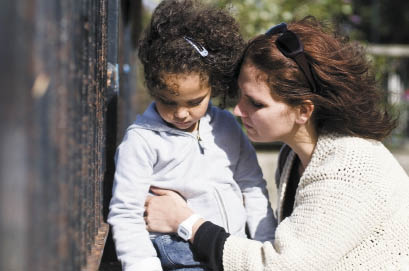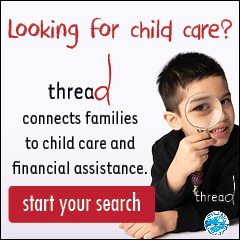
Big changes for
small people
For children, there is no
‘small change’
Story by Mara Severin
My even-keeled daughter likes traveling, sleepovers and meeting new people. Starting a new school was a breeze. She loves babysitters. So it shocked me when I came home with newly pierced ears and she promptly fell to pieces. “Why didn’t you tell me?” she cried. “I liked you the way you were before!”
It’s hard to know what changes will send your child round the bend, but one thing is certain: change is hard. Especially for children.
So what if your family is facing a change even more dramatic than my new earrings? An upcoming move? A divorce? A new baby? An illness? Or even just starting a new school? Transitions are tough, but there are ways you can make them easier for your child.
Time, talk and more talk
Swift action is great when removing a Band-Aid, but it’s the wrong strategy for reducing your child’s anxiety before a big change. Children need time to adjust, says Anchorage kindergarten teacher, Tara Gardeline. A child starting a new school will need time to worry about it, get excited about it and, above all, to talk about it. “Always be available to talk to them when they want… not necessarily when you want,” says Tara. Remove as much mystery as possible, she adds. “If possible, visit the school and meet the teachers. Explain that different places have different expectations. For kids who have attended preschool, explain that some things will seem familiar, but their day will be longer, the class bigger and that they have a job as a learner.”
The language of play
“Kids that age (5 and under) are concrete,” says Sylvia Kidd, MA, LPC, a Juneau therapist who works with families and children. When it comes to change, “don’t just tell them about it.” She suggests using toys as a way of explaining a difficult-to-grasp situation. Act it out, she says. “Here in the Southeast, when people move, that usually involves going on the ferry,” she says, by way of example. “You can show the family getting onto a little boat and waving goodbye.” She suggests repeating this ritual a few times in preparation for a big move or a similar transition.
Noah Shields, MFTA, of Foundations Family Resource Center in Soldotna, agrees. “Kids communicate through play,” he says. “Get down on the floor and let your child take the lead.” You can learn so much this way and your child learns something too, he says. “They learn that you’re there for them. You’re saying, ‘I’m here, I hear you, I understand and I care.’ ”
Tell the truth…
It’s tempting to tell a few white lies to help make a tough situation seem easier to your child, but resist the urge. Whitewashing can backfire, says Sylvia. “Don’t be vague.” This, she says, leads to a natural desire to “fill in the blanks.” And who knows how a child might do that? “Children are developmentally self-centered,” she says. “They think everything is about them. They may even blame themselves for something that is beyond their control.”
She recommends using clear, simple words. “Don’t be existential,” she says, even in the case of illness and death. “Say, ‘Grandma is getting older, she has an illness, and at some point she is going to die.’ ” If you’re afraid to use concrete words, you’re just going to make it more confusing, she adds. “You’re going to make it harder to help your child through her grief.”
Even less traumatic situations require straightforward communication, says Tara. For example, she says, when talking about school, “try to refrain from using the word ‘play’ too much. We’ve had several disappointed kindergarteners because they were told they could play all day.”
Cool, calm consistency
When things are upside down in your household, maintain normalcy where you can, says Noah. “As much as possible create routines and consistency,” he says. “Bedtime routines, morning routines, a reliable ‘heads up’ before introducing new things in the day,” he says. “Kids can get yanked around by adult schedules,” and this can lead to a sense of insecurity that can make bigger changes even more difficult.
Permission to cry
It’s important to give your children permission to feel sad about dramatic changes in their lives. “Let your child know that her feelings are expected and normal,” says Tara.
“Parents are often reluctant to allow their children to feel negative feelings because it’s hard on them, the parents,” says Sylvia. “But we don’t control our feelings.” For parents, she says, “it’s much better to help their child to experience the feeling.”
Asking for help
While some family situations can be difficult to talk about, Tara suggests keeping your child’s teachers and caregivers in the loop. “It helps us help the child if we know they are dealing with some life-changing events at home,” she says. “We can help facilitate discussions that the child may need. It also helps the child to have someone at school who they can talk with if need be.”
And don’t be afraid to turn to other professionals – if only the ones found at your local library. Tara suggests a few titles for some of the more difficult challenges that children face. For books that touch on divorce, she recommends: “I Don’t Want to Talk About It” by Jeanie Franz Ransom; and “Was it the Chocolate Pudding?: A Story for Little Kids About Divorce” by Sandra Levins. For books that deal gracefully with death, she recommends: “The Invisible String” by Patrice Karst; “The Fall of Freddie the Leaf” by Leo Buscaglia; and “Someone I Love Died” by Christine Harder Tangvaid.
‘Please put on your own oxygen mask before assisting others’
We’ve all heard that directive on an airplane, and it can be good advice for on-the-ground crises as well. Often, if a child is going through a difficult time, the whole family is too. So it’s important to take care of your own emotional health. “You can’t give away what you don’t possess,” says Noah. “You have to be building up those resources inside yourself. You have to be processing your own stress.” If we don’t, he says, we’re agitated, stressed and easily upset – all things that your children can see and be hurt by. “We sometimes think we’re hiding it, but we aren’t really.”
Work on your coping skills so that your children can develop theirs, he says. “Kids learn through imitation. They watch you and they learn. They have to hear you say, ‘Let’s find a healthy way to move through this.’ ”









